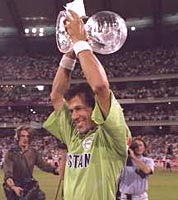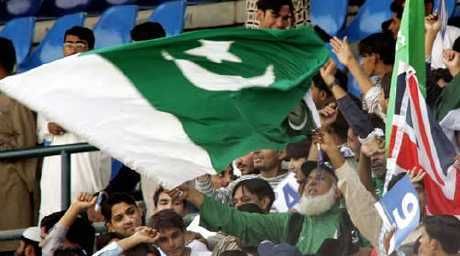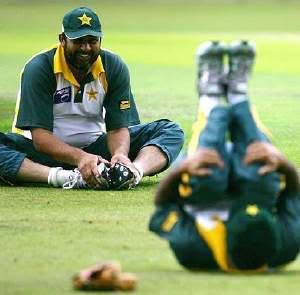After watching the abysmal and totally demoralizing defeat of the Pakistani cricket team in the one day international played at Cape Town, South Africa on February 11, 2007 it was quite evident that this team is nowhere close to being called a professional sports outfit. How else could you explain a thumping performance a few days ago in Durban, mixed in with lackluster and even downright pathetic performances during most of the other matches played on this tour?
This does not bode well for the Pakistan team being sent as the hopes of the nation in regaining the coveted World Cup 2007 in the West Indies only a month away. But the World Cup should be the least of our worries.
The real malaise that afflicts the Pakistani cricket team has to do with the more basic issue of professionalism and what it takes to become an international sports team in the highly competitive arena of world cricket. The problem stems from players not working on the basics of their game and relying on raw talent alone to get by. Gone are the days when amateurs would play limited first class games and then be drafted to the national side to learn on the job. Today’s cut-throat world of professional sports demands an ever-improving athlete or he is quickly over-taken by hungrier and younger talent.
Sadly the current Pakistani cricketers do not show the desire or the motivation to constantly improve the deficiencies in their game. Case in point are cricketers like Razzaq, Afridi, and Azhar who have been playing international cricket for almost ten years, with the first two having played more than 200 internationals, and they still repeat some of the same mistakes they made when they first arrived on the scene or have now regressed into bad habits that they fail to rectify.
 One of the major reasons for this malaise is the internal politics in the team and the PCB system (or lack thereof) that almost guarantees these players a spot despite their inconsistency and lack of improvement. Newer and younger talent is suppressed after a game or two in the name of stability or citing lack of readiness for international cricket when it is evident that many current players clearly do not perform at an international standard during most matches. Without constant competition from younger and more motivated players, unprofessional and lackluster performances from the chosen bunch are there for all to see.
One of the major reasons for this malaise is the internal politics in the team and the PCB system (or lack thereof) that almost guarantees these players a spot despite their inconsistency and lack of improvement. Newer and younger talent is suppressed after a game or two in the name of stability or citing lack of readiness for international cricket when it is evident that many current players clearly do not perform at an international standard during most matches. Without constant competition from younger and more motivated players, unprofessional and lackluster performances from the chosen bunch are there for all to see.
In any sport when players train or are going through a bad patch, the coaches tell them to go back to basics. Work on your technique and the performance will follow. How many times does Razzaq, a senior player and role model for the younger cricketers, have to get out like he did in the Cape Town match yet he still fails to improve that aspect of his game? How many times does he have to offer those ‘lollipopâ� �¢â€šÂ¬Ã¢â€žÂ¢ deliveries before his coach (or captain) comes and kicks him on his backside to make him bowl better or be shown the door? How many times does Afridi have to get out by swinging wildly to a nothing ball and then his fanatical admirers say that’s the way he plays so he can be forgiven! These men are hailed as match-winners when their consistency is worse than that of club cricketers or the neighborhood XI.
As Pakistani fans and cricket lovers who spend ridiculous amount of time, money and unbridled energy in watching this sport, we expect (nay demand!) our national cricket team to give their best and to keep improving their game as paid professionals. Most of the senior players on this team are under a PCB contract wherein they are paid monthly retainers (Rs. 200,000) equivalent to 70 times the average monthly income in Pakistan. This is over and above the match fees and some performance incentives that are paid to all players.
 Officially, the senior players, if they are fit and play all matches, are earning over Rs. 7-8 million per year! Therefore there is no earthly reason for the public to expect nothing less than their best effort EACH and EVERY time they take the field in the Pakistan colors. This doesn’t mean you perform once or twice in each series, cement your spot in the good books of the captain/coach and then go back to your slumber. In addition, it should be incumbent on every player to constantly work on improving their game.
Officially, the senior players, if they are fit and play all matches, are earning over Rs. 7-8 million per year! Therefore there is no earthly reason for the public to expect nothing less than their best effort EACH and EVERY time they take the field in the Pakistan colors. This doesn’t mean you perform once or twice in each series, cement your spot in the good books of the captain/coach and then go back to your slumber. In addition, it should be incumbent on every player to constantly work on improving their game.
Are these international players not aware of what sacrifices and training is done to stay competitive and win in world sports today? Do they not see or hear of how Tiger Woods practices his golf swing day and night, all year long? He still gets coached and makes adjustments to his swing, understanding the intricacies of the game, fixing the basics even after he has won all these tournaments and is the undisputed king of golf! Can they not see the videos of Roger Federer practicing diligently and ruthlessly on his serves, volleys, and backhand to stay at #1 in the tennis ranking even after a layperson can see that he is probably the most talented tennis player to have ever graced the sport.
 In the cricketing world every fan has heard about the awesome training routines of the Australians and the regimen of some of the best players who constantly strive to improve their game otherwise risk being relegated to the dustbin of world cricket. Imran Khan, the epitome of Pakistan’s cricket glory, writes in his own biography how he took the limited bowling talent he had and trained like a maniac to become one of the greats of all time. Why then do we have to live with the current state of the Pakistani cricket team? We all proclaim them to be hugely talented and they are well-compensated, but they still don’t give us the satisfaction of being the best or the confidence of becoming world beaters with any consistency!
In the cricketing world every fan has heard about the awesome training routines of the Australians and the regimen of some of the best players who constantly strive to improve their game otherwise risk being relegated to the dustbin of world cricket. Imran Khan, the epitome of Pakistan’s cricket glory, writes in his own biography how he took the limited bowling talent he had and trained like a maniac to become one of the greats of all time. Why then do we have to live with the current state of the Pakistani cricket team? We all proclaim them to be hugely talented and they are well-compensated, but they still don’t give us the satisfaction of being the best or the confidence of becoming world beaters with any consistency!
The problem with Pakistani cricket (and the nation in most aspects) is that the basics are all wrong. If Inzimam is a great batsman, who cares if his running between the wickets is terrible or his fielding is shabby. Afridi would be kicked out of any other international team because of his irresponsible batting, poor average and his antics off the field but for Pakistanis he is the “beast” because he will hit one six per game and score a quick-fire fifty once every 20 matches. The under-achieving Razzaq is the same way. We let their pathetic performances slide because of the one moment of glory when they hit McGrath for a six, or clean bowl Tendulkar. No one ponders on the fact that McGrath, Pollock and Tendulkar take them to the proverbial cleaners 90% of the time.
Professionalism demands that you go back to the basics and work on every weak part of your game and it starts from the very top. What the PCB needs to do to become a more professional organization requires a whole other essay but there is nothing stopping each player on his path to professionalism. The basics of training, nutrition, and psychological well-being can be mastered by any of the present cricketers with the resources now available to them.
For Inzimam, it means he improve his fitness and his running between the wickets. It also means he should take lessons from his media-savvy friends (or hire a PR professional) to improve his communication with other teams and the press. God knows he will have a life after cricket. He is the leader of the team and many times its sole spokesman and that is his job.
For Yousuf it may mean he works on his fielding and throwing.
For Asif it requires hiring a nutritionist, taking better care of his body and training how to bowl on flat wickets.
For Afridi, Razzaq and the rest of the team – well it is quite evident what they all need to do to justify the millions being paid to them for representing their country. Since there is no compulsion in cricket, if you can’t do what’s necessary to become a professional cricketer then please spare the nation the embarrassment of another pathetic performance and get another job.
Until and unless the Pakistani cricketers realize what it means to be called a PROFESSIONAL sportsman they should stop saying ‘InshAllah’ we will beat India / Australia / South Africa, or state that we will win the World Cup. Please don’t drag God into cricket when you are not willing to adhere to the standards of a professional sport or the honor of representing your country.

As fans, patriots and well-wishers of Pakistan cricket we deserve better than the schizophrenic nature of our team’s performance. This myopic obsession with the cricket World Cup is akin to asking Tiger Woods to win the Master’s and then forgetting about the PGA tour for the rest of the year. We all hope for our team to win the World Cup but that should not be the solitary standard we hold them accountable to. Great teams are not single tournament winners or flash-in-the-pan performers. The Pakistan team of professional cricketers needs to show up ready and willing for every international series and tournament. When they don the Pakistan greens or the cap, they need to demonstrate to the world that they are the hopes and aspirations of 150 million people and will not go home without a fight.





















































Listen to MAHI
quoting ” All Pakistan fans, this should make you feel better. In 2003, India had a disastrous tour of NZ, the last one before the WC. They got slammed in the ODIs, barely crossing 200….”
This is exactly what is wrong with Pakistanis, compare with somneone else shortcomings and failures and feel better. You are missing the point.
Who cares if India did the same in NZ tour? when will we learn to not accept medicrity, when will own upto our own shortcomings?
All Pakistan fans, this should make you feel better. In 2003, India had a disastrous tour of NZ, the last one before the WC. They got slammed in the ODIs, barely crossing 200, if that. And this was NZ, not AUS or SA. Then they went on to do well in the South African WC. I see a parallel here with Pakistan’s situation now.
The parallel can get disappointing as we lost the Finals. But hey, will you mind a shot at the title in the WI?
Zamanov, I’m not suggesting that Pakistani batsmen are not “born” to play on seaming tracks; I’m suggesting they’re not “bred” to play on seaming tracks. The same is true for India and Sri Lanka, it’s not something specific to Pakistan. You can check out their “away” records versus ours.
@Akif Nizam: I think you are just trying to be argumentative now without focusing on the theme of the article. Since this is a piece about Pakistan cricket I think you should keep the discussion to that topic. We are not here to discuss the merits of tennis players. The only reason I mentioned Federer and Tiger in my piece was solely to emphasize that they are true professionals who do not rely on their talent alone to dominate their sport. I do not follow tennis as closely as cricket, but I know this much that Grand Slam winners are considered ‘greater’ or better all-around tennis players than those who dominated a single tournament for many years. Hence Agassi, Graf, Laver, Navritalova as winners of majors on all surfaces are considered in a higher light. I will leave it at that.
Getting back to Pakistan cricket, I sense a serious lack of cricketing and common sense in your argument that Pakistani batsmen are just not ‘born’ to play overseas or on seaming tracks because of some innate deficiency. I suggest that you start renting tapes of performances of Mohammad Yousuf while he scored a century in Australia, multiple centuries in England and good scores in the recent trip to South Africa. I would also recommend you look up some of Zaheer’s performances in England, and let’s not forget Javed and Saleem Malik on multiple tours to England. You see Mr Nizam, batting on different tracks is not some innate talent that you cannot train for improvement. Yes it requires infrastructure from the PCB to develop bouncier/seaming tracks at home, but it also requires batsmen to be “PROFESSIONAL” enough to train on different tracks, improve their skills, and sharpen their mental focus. Just ask Michael Clarke who debuted with a century in India and how the rest of the Aussies applied themselves to win on horrendously spinning tracks totally alien to their home ‘culture’. Batting is a skill that can be honed with application, training and confidence.
I could go on and on about the intricacies of batting but I hope the above points help settle your fallacious argument about the innate inability of Pakistani batsmen to play on different tracks.
Zamanov, saying that someone is a world class talent, or is more talented than or less talented than someone else, these are all subjective terms. Our players are very talented indeed; they are talented at what they do best: hit the ball with the bat when the bounce is low and the ball comes on to the bat. They are not very talented when the bounce is high and the ball moves around. It’s a function of where they come from and what they are accustomed to. For you to proclaim that their failure abroad is due to a lack of effort is an unprovable, unfair statement, given that no batsman is Pakistan cricket’s history has been able to consistently perform on seaming pitches.
I’ll give you a perfect analogy, again from tennis. Sampras won 13 grand slams but all on hard courts and grass; never won the French open where the bounce is low and the ball comes on to the racquet late. Does that mean that he was not “professional” enough to adjust his game on clay? ….or is it that you just need a different set of skills to deal with different surfaces you play on?